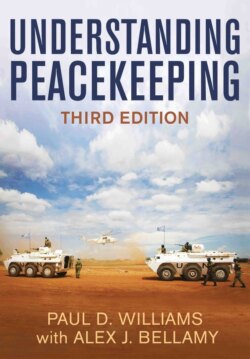Читать книгу Understanding Peacekeeping - Alex J. Bellamy - Страница 32
2.2 States as peacekeepers
ОглавлениеPeace operations are sometimes initiated and led by states. Usually, they act as part of a multilateral coalition but on rare occasions they act alone. Pivotal states initiate, lead and provide a significant material contribution to a peace operation, which may or may not be authorized by an international organization. Often, the material contribution made by other members of the coalition or organization is insubstantial. This means pivotal states generally try to form coalitions in order to enhance the legitimacy of these operations rather than to share the material burdens (Coleman 2007).
The motives that influence states to provide peacekeepers are discussed in more detail in chapter 12. Here, we’ll just note four generic reasons why states might want to conduct peace operations outside of an international organization. First, regional hegemons might want to press their own claims to territory, economic benefits or access to natural resources, or to support the socio-political ambitions of allies. Often, such hegemons also have a vested interest in maintaining regional order and the prevailing regional status quo. Russian peacekeeping and mediation through the CIS in Abkhazia/Georgia and Nigerian peacekeeping through ECOWAS in West Africa provide good examples of regional hegemons acting as pivotal states initiating and leading peace operations to maintain regional order. This type of peacekeeping may be a thinly veiled attempt to secure the hegemon’s national interests. In Moldova in 1992, for example, some 12,000 troops from the Russian 14th Army were deployed to the breakaway republic of Transdnestr as part of a so-called disengagement force. In reality, the troops acted to buttress the Transdnestrian secession (McNeill 1997: 99). In more positive terms, regional hegemons have an interest in maintaining order in their neighbourhood, and they are by definition more militarily capable than their neighbours and therefore may make effective peacekeepers. Regional hegemons should also have a good understanding of the dynamics of the conflict they are trying to manage, though they are also more likely to have an economic and political interest in the outcome of the conflict.
Figure 2.3 Authority, command and control in multidimensional UN peacekeeping operations
Former colonial powers that continue to have close economic, political and social ties with their former colonies may also conduct peace operations. For example, French troops garrisoned in Côte d’Ivoire acted as peacekeepers after the outbreak of civil war there in 2002. Alternatively, Britain’s Operation
Palliser, deployed to Sierra Leone in 2000 in support of President Kabbah’s government and the beleaguered UN operation UNAMSIL, stemmed from a mixture of motives, but a sense of attachment resulting from the former colonial relationship was one of them (Williams 2001). Former colonial powers may be motivated by the desire to support elected or friendly governments, help maintain regional order, protect perceived economic and political interests, support humanitarian concerns, or protect significant communities of nationals from the metropole.
Concerned neighbours are a third category of state that might conduct unilateral operations or act as a pivotal state when war, economic collapse and/or massive human rights abuse occur in their own ‘backyard’ (James 1990). They may be prompted to act by concerns about negative spillover effects as well as regard for the welfare of neighbouring populations. For instance, the Italian-led operation in Albania in 1997 was prompted by the desire to stem the flow of Albanian refugees into Italy, a perceived need to restore regional order, and humanitarian concerns (Bellamy 2002a: 64). Similarly, Australia acted as a pivotal state in creating the INTERFET mission to East Timor in 1999, primarily because of domestic pressure to do something to protect an endangered population near Australia’s borders.
Finally, great powers might act unilaterally or as pivotal states in initiating and leading peace operations. For instance, in 1982, Israel’s refusal to allow the UN to supervise the withdrawal of PLO forces from Beirut persuaded the Americans to seek alternative options, and it was the US that acted as a pivotal state in the creation of the multinational force deployed to Lebanon (Diehl 1994: 58–60). In this case, the US was prompted to act to maintain stability in a distant region out of concerns for global order and the threat of violent escalation that was carried by the Middle East conflict, as well as to secure its own interests in the region.
